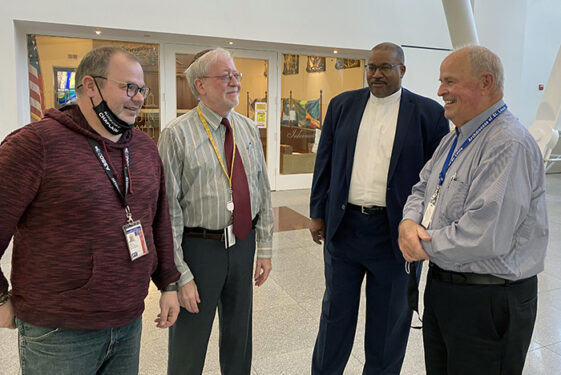
Noting their similar struggle, one says, ‘God made a way out of no way’
PROSPECT HEIGHTS — In St. Louis, they found a way.
Two airport chaplains from the Midwest recently visited New York City and instantly identified with the struggles of their local counterparts to establish a multi-faith chapel at nearby LaGuardia Airport.
They had a similar experience that began in 2018, when one of the two chapels they operate was commandeered for restaurant space at St. Louis Lambert International Airport.
Rev. Roderick Burton, also a Baptist church pastor in St. Louis, and Catholic Deacon Jim Martin, serve the St. Louis Airport Interfaith Chaplaincy at Lambert International.
Rev. Burton and Deacon Martin came to the city on Nov. 9 for a “best practices” networking session with Father Chris Piasta and Rabbi Ari Korenblit. They are two of the chaplains at JFK International Airport, and they want a new chapel somewhere in the three terminals of LaGuardia now under renovation.
The company in charge of renovating and operating Terminal B set aside a “meditation room,” but also informed Father Piasta three years ago that no religious services could be held there. The priest and rabbi are contesting that ruling, while also looking for other options, possibly in or near Terminals C and D.
It’s a worthy cause, said their friends from St. Louis.
“Ironically, when we’re talking internationally, we’re doing more fighting over this stuff here in the United States,” Rev. Burton said. “If you don’t have folks like Chris and Ari to bring that up, then the airport authorities will assume that the travelers don’t want it [a chapel]. They’ll tell you the market is saying we need more food for the passengers.”
But that wasn’t the case in St. Louis, Rev. Burton explained. Pushback from the public and some politicians followed media reports of the chapel’s demise.
The issue there began in December 2018, shortly after Rev. Burton became president of the airport’s interfaith chaplaincy. He said Three Kings Public House restaurant — which had a full-sized operation inside the airport — wanted to locate a smaller kiosk nearby to sell its food to passengers.
But the desired corner spot was already occupied by the interfaith chapel, “so they took the chapel,” Rev. Burton said.
That interfaith space “was pretty nice,” Deacon Martin said, adding that it was located past the security-check bustle.
“We could fit eight chairs in that small space,” he said. “People would come in and they could find a little solace. And we have the presence of the Eucharist in our chapel all the time. People can pray and know that they’re in the presence of the Lord.”
He added that there were no other Catholic-specific religious symbols, and people of other faiths freely used it. Rev. Burton said Muslim worshipers have brought prayer rugs to the chapel for prayer.
When local media reported the chapel’s demise, the airport’s switchboard lit up, Deacon Martin said.
“It sort of multiplied and took a life of its own,” he said. “People were saying, ‘They’re trying to throw God out of the airport!’”
Rev. Burton noted that some of those complaining were members of the airport’s governing board and elected representatives to city government. Religion, the visiting chaplains agreed, is taken very seriously in that Midwest region bordering on the “Bible Belt.”
Rev. Burton said the administrators who made the decision simply did not think it through by offering an alternative location for a chapel that was inside the secure boundaries. The other chapel is located outside the security portals.
Consequently, he said, the administrators appeared to be dismissive of opportunities for airport users to worship at the airport.
“There was no plan until there was pressure,” he said. “At first, they were defensive, and said, ‘Oh, well, there’s already another chapel.’
“But then, when the reporters came back, I said, ‘Well, here’s the issue with that: we’re thankful for that one chapel, but that chapel was outside of a secure area. It’s not practical; people don’t come out of security to go to the chapel.”
Rev. Burton said St. Louis’ interfaith community mobilized to advocate for a return of the chapel. Ultimately, however, the most compelling arguments were made by the airport’s customers in a survey.
“They just like the idea of a chapel,” Rev. Burton said; the prevailing attitude was, “‘I may not come in here, but I like knowing that I could if I wanted to.’”
The airport’s administration agreed to create another space for the chapel. Rev. Burton and Deacon Martin admitted it’s an out-of-the-way location; still, they’re happy to have it because it’s close to an area where airlines can potentially build new gates.
“It was gratifying to get a win,” Rev. Burton said. “As we say in the African American Baptist community, ‘God made a way out of no way. ’”
No further updates on the LaGuardia chapel request were confirmed as of this writing, but Father Piasta and Rabbi Korenblit have expressed optimism that a solution could materialize.
Meanwhile, Rev. Burton suggested the JFK chaplains recruit more partners.
“Get the interfaith community involved,” he said. “And get the travelers. I started doing an old-school thing — getting them to sign a guest book. That way you can show the numbers.”
He also urged chaplains to keep doing what they do best: providing spiritual comfort and guidance to the traveling public, which proves an airport’s chaplaincy is a “value-added” service. He said chaplains constantly give directions, help customers find luggage, and always with smiles on their faces.
“I train our chaplains to be an extension of the customer service at an airport,” he said. “That’s our path.”
